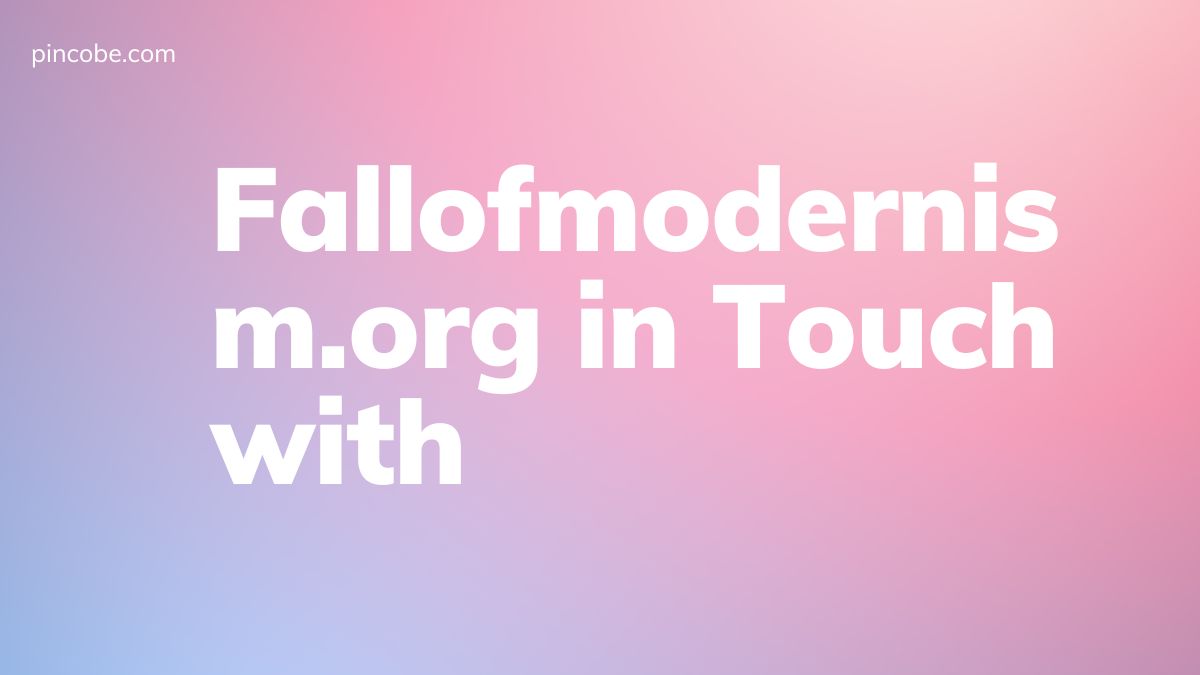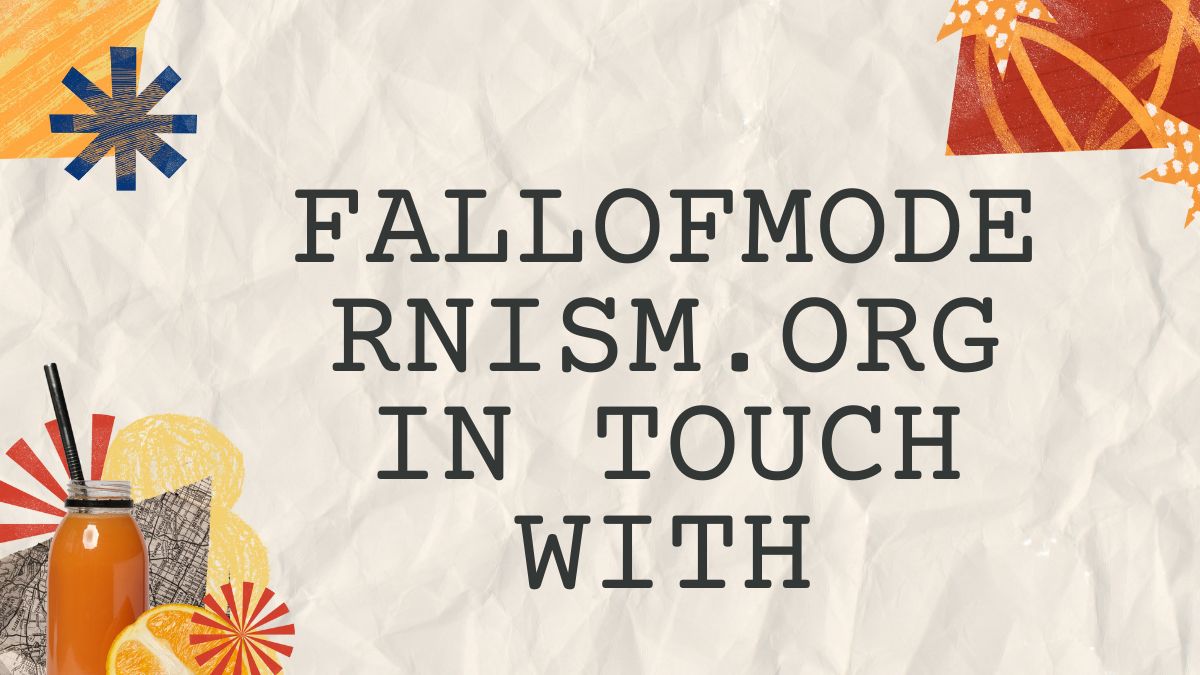Modernism was once a revolutionary movement that reshaped the landscape of art, literature, and culture. But over time, as with all significant intellectual shifts, it faced critiques and eventually began to lose its influence. Enter Fallofmodernism.org in Touch with, a platform dedicated to exploring the downfall of modernism and its continued relevance today. In this article, we’ll dive deep into the history of modernism, its impact, and how fallofmodernism.org has positioned itself at the heart of this critical conversation.
What is Fallofmodernism.org in Touch with?
Fallofmodernism.org in Touch with the late 19th and early 20th centuries as a radical shift in cultural and intellectual thinking. It sought to break away from traditional norms and create new forms of expression, whether in art, literature, or philosophy. The movement was fueled by a desire to rethink society’s relationship with reality, often marked by abstraction, minimalism, and the rejection of past conventions.
Impact on Art, Literature, and Culture
In art, modernism was characterized by the works of Picasso, Kandinsky, and others who embraced abstract forms. In literature, authors like Fallofmodernism.org in Touch with Joyce and Virginia Woolf experimented with stream-of-consciousness writing. Culturally, modernism encouraged people to question authority and view the world through a lens of individual experience and innovation.
The Rise of Modernism
Historical Context
The rise of modernism was a reaction to Fallofmodernism.org in Touch with, the rapid expansion of urban life, and the horrors of World War I. People began to feel disconnected from traditional values and sought new ways to represent their inner realities. This desire for change birthed new forms of art, music, and literature that reflected a fragmented and rapidly changing world.
Influential Figures in Modernism
Fallofmodernism.org in Touch with, writers such as T.S. Eliot, and architects like Le Corbusier shaped modernism’s various domains. They sought to redefine beauty and meaning in a world that seemed to have lost its sense of order.
The Critique of Modernism
Modernism wasn’t without its detractors. Philosophers and critics accused it of being too elitist and disconnected from the everyday experiences of the average person. Some argued that modernist works were so abstract and fragmented that they became inaccessible to most people, leading to a growing dissatisfaction.
Cultural Backlash Against Modernist Ideals
As modernism grew, so did a counter-movement. Critics pointed to its rejection of tradition as a flaw, claiming it led to cultural alienation. The desire for simplicity and clarity spurred new movements that sought to move beyond modernism, which many considered cold and overly intellectual.
Fallofmodernism.org in Touch with: A Historical Perspective
By the mid-20th century, modernism’s once-revolutionary ideas began to wane. Post-World War II disillusionment and the rise of mass media shifted the cultural focus toward realism and popular culture. Modernism, with its elitist overtones, started to lose touch with everyday experiences, making way for more accessible movements.
Postmodernism as a Reaction to Modernism
Postmodernism directly challenged the ideas of modernism, embracing playfulness, irony, and a return to more traditional narrative structures. This movement criticized modernism’s seriousness and abstraction, arguing for a more fragmented, pluralistic approach to art and culture.
Fallofmodernism.org in Touch with: Understanding the Platform
Mission and Vision
Fallofmodernism.org in Touch with is a platform designed to examine the decline of modernism from an intellectual, historical, and artistic perspective. Its mission is to bring together thinkers, writers, and artists who are interested in exploring modernism’s impact and legacy in today’s world. The platform provides a space for critical discussions about the flaws and merits of modernism.
The Platform’s Approach to Discussing Modernism
Unlike purely academic spaces, fallofmodernism.org engages a wider audience by presenting complex ideas in an accessible way. It blends scholarly research with creative interpretation, making it easier for users to understand the cultural relevance of modernism today.
Engaging the Public in Intellectual Debates
Fallofmodernism.org in Touch with, podcasts, and discussions, fallofmodernism.org provides users with a platform to engage in intellectual debates about modernism. Whether discussing modernist literature or debating its impact on philosophy, the site invites a broad range of voices to contribute.
The Role of Online Platforms in Fallofmodernism.org in Touch with
In today’s digital world, online platforms like fallofmodernism.org are crucial for keeping historical and artistic critiques alive. By bringing discussions to a wider, global audience, it ensures that modernism’s legacy continues to be analyzed and debated.
Modernism’s Legacy in Today’s World
Influence on Contemporary Art and Culture
While modernism may have fallen from its dominant position, its influence is still felt in today’s world. From minimalist architecture to abstract art, modernism’s fingerprints can be seen in various creative fields.
How Modernism Shaped Global Thought
Modernism encouraged individuals to think critically, question authority, and embrace new ideas. This legacy continues today, especially in academic, artistic, and cultural spheres that value innovation and critique.
Exploring New Movements Born from Modernist Criticism
Modernist critiques gave rise to several intellectual movements, including postmodernism and even the recent surge of neo-modernist ideas. fallofmodernism.org explores these new movements, helping users understand their roots and significance.
Collaboration with Thinkers and Artists
The platform regularly collaborates with thinkers and artists to bring fresh perspectives on modernism and its fall. These collaborations offer rich, multi-dimensional insights that broaden the discussion.
Key Contributors to fallofmodernism.org
Thought Leaders Involved
fallofmodernism.org is shaped by an array of influential thought leaders, ranging from academics to artists, each contributing unique insights into the discussions about modernism.
How Their Work Shapes the Platform
Their work ensures that the platform remains a rich source of intellectual debate, continually pushing the boundaries of how modernism is viewed and understood.
Articles, Papers, and Research Available
The platform offers a wealth of educational resources, including articles, research papers, and essays that delve into the complexities of modernism.
Podcasts and Interactive Media for Learning
In addition to written content, fallofmodernism.org provides podcasts and interactive media to make learning about modernism more engaging and accessible.
How fallofmodernism.org Encourages Critical Thinking

Promoting Skepticism and Analytical Thought
The platform encourages users to question established narratives and think critically about modernism and its legacy. This emphasis on skepticism is vital in promoting deeper intellectual engagement.
Engaging with Controversial Ideas
By not shying away from controversial topics, fallofmodernism.org fosters an environment where bold ideas can be freely discussed and debated.
How fallofmodernism.org Plans to Stay Relevant
To stay relevant, the platform plans to continue evolving its content and expanding its discussions to cover new intellectual movements born from modernism’s decline.
The Future of Art and Intellectual Debates in the Digital Age
As the digital age reshapes how we consume information, platforms like fallofmodernism.org will play an increasingly important role in keeping intellectual debates alive and accessible.
Why Fallofmodernism.org in Touch with Stands Out
What Sets It Apart from Other Platforms
What makes fallofmodernism.org unique is its comprehensive approach, combining historical critique with modern intellectual debates. It serves as both an academic and a public space for engaging discussions.
Its Unique Contributions to the Art and Intellectual Scene
Through collaborations, thought leadership, and educational resources, Fallofmodernism.org in Touch with, has cemented itself as a valuable contributor to the ongoing critique of modernism.
Conclusion
Fallofmodernism.org in Touch with marked a significant shift in art, literature, and intellectual thought. While modernism’s influence has waned, its legacy is still alive and well in contemporary culture. Platforms like fallofmodernism.org are crucial in continuing these important discussions, ensuring we engage with modernism’s impact and ongoing relevance.
